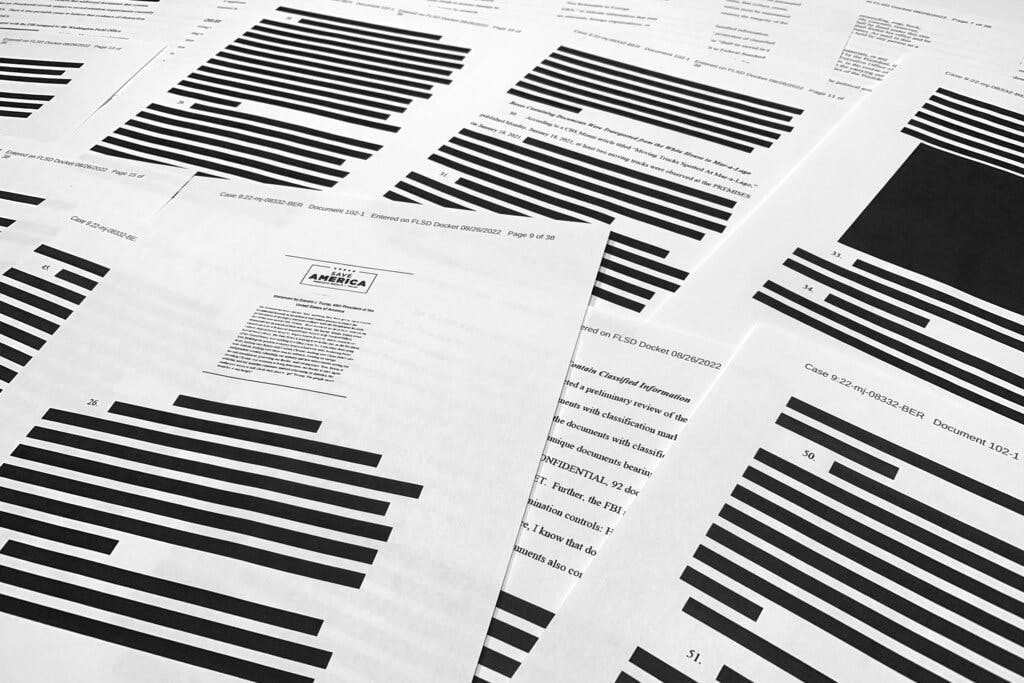Affidavit, Redactions and All, Suggest a Case Is Being Built Against Trump
The document, while heavily blacked out, provides the clearest view yet of the case the Biden administration is eying against the former president.

Updated 4:15 PM
The Department of Justice, under a judicial order to unseal, released its affidavit in respect of the search of President Trump’s Mar-a-Lago compound. The document, while heavily redacted, nevertheless provides the clearest view yet of the case the administration is building against Mr. Trump.
That case was prompted by the return of 15 boxes to the National Archives that allegedly contained “184 unique documents bearing classification markings, including 67 documents marked as CONFIDENTIAL, 92 documents marked as SECRET, and 25 documents marked as TOP SECRET.”
The investigation began when agents were alerted to the “highly classified documents intermingled with other records” in those boxes. Some of these contained details of “human sources, commonly referred to as ‘human intelligence.’” The FBI also found that the classified documents contained National Defense Information, known as “NDI.”
A federal judge, Bruce Reinhart, issued the warrant for the search of Mar-a-Lago after being persuaded by the affidavit that “probable cause exists to believe that evidence, contraband, fruits of crime, or other items illegally possessed in violation of multiple federal crimes” would be discovered at the Palm Beach compound.
The affidavit says: “The government is conducting a criminal investigation concerning the improper removal and storage of classified information in unauthorized spaces, as well as the unlawful concealment or removal of government records.” The DOJ notes that it spoke to “a significant number of civilian witnesses” before filing its affidavit.
The government argues that in addition to what was recovered in its search, it has “probable cause to believe that additional documents that contain classified NDI or that are Presidential records subject to record retention requirements currently remain at the PREMISES.” This also includes “evidence of obstruction.”
The document appeared just after noon Friday, though the Pacer docket system seemingly crashed under the weight of interest in the release. About half of the affidavit is redacted, portions that could point to the nature of the documents seized or the methods with which the DOJ is conducting its investigation.
The affidavit does offer a glimpse into the range of documents the DOJ has already viewed, among them material that contains FISA warrants, classified information not releasable to foreign nationals or governments, and material gained from intelligence intercepts.
In addition to a glimpse of the evidence, the affidavit also contains clues to the legal arguments Attorney General Garland’s team of lawyers are likely to make should President Trump be charged. The government appears to be proactively countering the argument that President Trump declassified the relevant documents while in office.
On that score, a footnote notes that the Espionage Act, named in the affidavit as a statute that Mr. Trump is suspected of violating, “does not use the term ‘classified information,’ but rather criminalizes the unlawful retention of ‘information relating to national defense.’” The Espionage Act, which was passed into law in 1917, predates the modern system of classification, implemented via executive order by President Roosevelt in 1940.
The DOJ also filed a memorandum making its argument for keeping the affidavit under seal, arguing: “If witnesses’ identities are exposed, they could be subjected to harms including retaliation, intimidation, or harassment, and even threats to their physical safety.”
The government’s lawyers also argued that “the affidavit is replete with further details that would provide a roadmap for anyone intent on obstructing the investigation.” They fret: “Exposure of witnesses’ identities” would “almost certainly chill other potential witnesses from coming forward in this investigation and others.”
In the memo, which is itself streaked with redactions, the DOJ claimed that “the government has well-founded concerns that steps may be taken to frustrate or otherwise interfere with this investigation if facts in the affidavit were prematurely disclosed.”
The affidavit notes that “the FBI has not yet identified all potential criminal confederates nor located all evidence related to its investigation,” suggesting that more people could yet be swept into the government’s investigatory ken.

